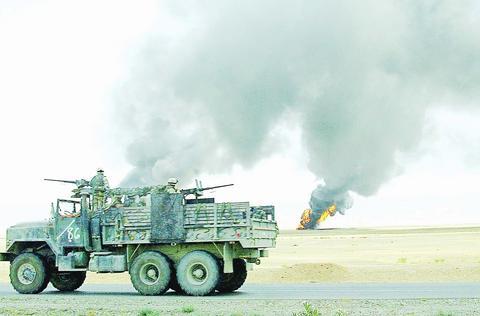Oil prices fell nearly 4 percent on Friday after the International Energy Agency said big consuming countries were more comfortably supplied than it previously thought.
US light crude tumbled US$1.18 to US$30.33 a barrel, extending Thursday's sharp losses and pulling prices back from recent 12-week highs above US$32. London August Brent crude fell US$0.87 to US$26.35 a barrel.

PHOTO: AFP
Prices fell as the Paris-based IEA, energy adviser to 26 industrialized nations, said its previous estimate of oil stock levels was 79 million barrels too low.
The agency's revised estimate put oil stocks in the industrialized world for the end of April at 2.439 billion barrels,
"Stocks are still below normal and can absorb some surplus in the third quarter, but I think we have entered a stage when more supply is coming on the market and will impact prices," said Geoff Pyne, oil market consultant to Sempra Energy Trading.
The IEA said the revision did not change its view that global markets were tight. Stocks are still 157 million barrels, or 6.5 percent, below last year.
"The market is obviously better supplied than we thought as little as two weeks ago, but stocks are still low and fundamentals are still tight, so we need to build more stocks," said Klaus Rehaag, editor of the IEA monthly oil market report.
"The increase in crude stocks may, however, signal some relief for an otherwise tighter heating oil situation later this year," he added
Oil stocks have been drawn down this year by a harsh northern winter and supply disruptions from a strike in Venezuela, ethnic strife in Nigeria and the war in Iraq.
Iraq on Thursday sold its first oil since the US-led invasion nearly three months ago, but looting and sabotage at oil facilities are expected to keep Iraq's exports well below prewar levels for several months.
The delays in Iraq's postwar export resumption enabled the OPEC producer cartel to postpone fresh supply cuts at Wednesday's meeting in Qatar.
OPEC, which controls about half the world's oil exports, decided to meet again in just seven weeks, on July 31, in case the return of Iraqi shipments undermines high prices.
OPEC sets a US$22 to US$28 target range for its basket of seven grades of crude oil. The basket was last valued at US$27.48.

MULTIFACETED: A task force has analyzed possible scenarios and created responses to assist domestic industries in dealing with US tariffs, the economics minister said The Executive Yuan is tomorrow to announce countermeasures to US President Donald Trump’s planned reciprocal tariffs, although the details of the plan would not be made public until Monday next week, Minister of Economic Affairs J.W. Kuo (郭智輝) said yesterday. The Cabinet established an economic and trade task force in November last year to deal with US trade and tariff related issues, Kuo told reporters outside the legislature in Taipei. The task force has been analyzing and evaluating all kinds of scenarios to identify suitable responses and determine how best to assist domestic industries in managing the effects of Trump’s tariffs, he

TIGHT-LIPPED: UMC said it had no merger plans at the moment, after Nikkei Asia reported that the firm and GlobalFoundries were considering restarting merger talks United Microelectronics Corp (UMC, 聯電), the world’s No. 4 contract chipmaker, yesterday launched a new US$5 billion 12-inch chip factory in Singapore as part of its latest effort to diversify its manufacturing footprint amid growing geopolitical risks. The new factory, adjacent to UMC’s existing Singapore fab in the Pasir Res Wafer Fab Park, is scheduled to enter volume production next year, utilizing mature 22-nanometer and 28-nanometer process technologies, UMC said in a statement. The company plans to invest US$5 billion during the first phase of the new fab, which would have an installed capacity of 30,000 12-inch wafers per month, it said. The

Taiwan’s official purchasing managers’ index (PMI) last month rose 0.2 percentage points to 54.2, in a second consecutive month of expansion, thanks to front-loading demand intended to avoid potential US tariff hikes, the Chung-Hua Institution for Economic Research (CIER, 中華經濟研究院) said yesterday. While short-term demand appeared robust, uncertainties rose due to US President Donald Trump’s unpredictable trade policy, CIER president Lien Hsien-ming (連賢明) told a news conference in Taipei. Taiwan’s economy this year would be characterized by high-level fluctuations and the volatility would be wilder than most expect, Lien said Demand for electronics, particularly semiconductors, continues to benefit from US technology giants’ effort

‘SWASTICAR’: Tesla CEO Elon Musk’s close association with Donald Trump has prompted opponents to brand him a ‘Nazi’ and resulted in a dramatic drop in sales Demonstrators descended on Tesla Inc dealerships across the US, and in Europe and Canada on Saturday to protest company chief Elon Musk, who has amassed extraordinary power as a top adviser to US President Donald Trump. Waving signs with messages such as “Musk is stealing our money” and “Reclaim our country,” the protests largely took place peacefully following fiery episodes of vandalism on Tesla vehicles, dealerships and other facilities in recent weeks that US officials have denounced as terrorism. Hundreds rallied on Saturday outside the Tesla dealership in Manhattan. Some blasted Musk, the world’s richest man, while others demanded the shuttering of his